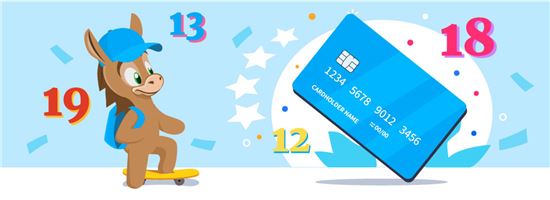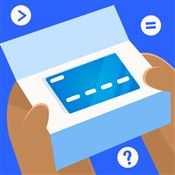How Old Do You Have to Be to Get a Debit Card
Can you get a debit card at 13 years old? Find out the best age to get a debit card and how to choose a debit card for kids and teens.
 |
Getting your first debit card is a financial rite of passage.
It's a taste of financial freedom and a sign you're ready to handle money like a real adult. (No more digging around in pockets for loose change and crumpled bills.)
But how old do you have to be to get a debit card? And how do you know if your child is ready? Find your answers below, plus which kid's debit cards are worth it.
What is Debit Card for Teens?
A debit card lets your teen buy something with money from a checking account. But there are more restrictions. This can help you show them smart money practices.
Some debit cards let them pay with money from their parent's checking accounts. Others have prepaid features, where you can add money for your teen to spend. Or you could help them set up their own checking account.
There are some other limits as well, such as no mobile check deposits and spending alerts.
Finally, there can be beneficial features like financial education resources. Some accounts have easy-to-understand lessons, savings goals, missions, and points to level up, treating savings like a video game.
What Age Can You Get a Debit Card?
To open a bank account for yourself, you need to be a legal adult - that is, 18 years old. In Alabama and Nebraska, however, you must be at least 19.[1][2]
But what if you want to open an account for your child? With help from a parent or guardian, the age for getting a debit card can be much lower.
Typically, a parent can open a checking account for teens ages 13 years and older.[3] Your teen will have their own debit card and account. Once the child is of age, the account can convert to an adult account.
If your kid is younger than 13, a prepaid debit card is usually your only option. These cards usually have low or no minimum age requirements. Prepaid debit cards aren't directly linked to a bank account. You must load the card with money before you use it.
What Age is Best to Get a Debit Card?
The best age for a kid to get a debit card really depends on the kid's maturity level. Having a frank discussion about spending and money management with your kids is important.
Generally, ages 7 to 13 is a great time to introduce your child to a debit card. At this age, most kids can understand the basics of handling money. Of course, you'll have to keep an eye on their spending at first.
Be prepared for some money mistakes and unwise spending in the beginning. It's all part of the learning process. As long as you're there to guide your child in the right direction, there's no need to worry.
Why Should Parents Consider Debit Card For Kids?
Getting a debit card for your child can help teach them important financial lessons, such as:
- Creating a budget: You and your child can sit down together, and clearly see how much money they have and how much they can spend.
- Starting to save: As your teen manages their account, they can start to feel the rewarding feelings that come with growing their savings.
- Spending responsibly: With the chance to more easily spend their money, your teen can get real-world feedback on their spending decisions.
- Financial independence: Your child can learn to handle the freedom that comes with their own card and money.
As a parent, there's a balance between shielding your child and helping them grow on their own, and you understand this balance best.
That's why getting your teen a debit card can give them some responsibility to learn about money on their own while offering features to help you protect them.
5 Signs Your Child Is Ready for a Debit Card
- Your kid gets an allowance. If your kid already receives an allowance, a debit card and banking app can make it easier to transfer, save, and spend money wisely.
- Your kid has a job. Instead of cashing every paycheck, your child can keep their money safe in a checking account or prepaid debit card account. This makes it easier to manage money without fussing with cash.
- Your child uses your debit card. Tired of your kid always asking for your card? If they've been using your debit card responsibly, it's a good time to get them a card of their own.
- Your child goes out independently. If your kid goes to the movies or restaurants with friends, a debit card offers the right amount of freedom. You can still monitor your kid's spending without having to always be there.
- Your kid wants to save and spend money. If your child wants to build up some savings, a debit card can help. Many debit cards allow kids to save money in their account, separate from spending money.
What to Look for in a Debit Card
If you're opening an account for your child, here are a few key features to consider when looking for a debit card:
Age Requirement
First, be sure to check the age limit. Most traditional banks require children to be at least 13 years old. But prepaid debit cards and banking apps often have much lower age requirements.
Fees and Pricing
A debit card with no monthly fee is best if you need a simple account to deposit and spend money. Debit cards with a monthly fee can be worth it if they offer extra features that you want, like educational content or investment accounts.
Whichever route you choose, be sure to find out about all the account fees and banking fees. You don't want to be surprised by high fees for ATMs, overdrafts, or card replacements.
Security
Find out how your debit card provider keeps you safe. Features like SSL encryption and two-factor authentication help keep your account secure. Always be sure your debit card is issued by an FDIC-insured bank. This will protect money in your account up to $250,000 in case the bank fails.
Parental Controls
Kids will make some mistakes when they start managing their own money. A debit card that lets you set spending limits and block merchants can give you peace of mind. Not every debit card offers extensive parental controls, so check to see which options you have.
Savings Goals
Some debit cards allow kids and teens to separate spending money from savings. This is a great way to get into the habit of setting financial goals and working toward them.
Educational Content
Most kids don't learn nearly enough about personal finance. Debit cards for kids often offer an educational app with money lessons built in. If your child is still a novice when it comes to understanding money, this is a fantastic tool.
Pros and Cons of a Debit Card
Pros
- More convenient and more secure than cash. If your kid loses their card, you can lock it immediately and prevent others from using the funds. Plus, it's faster and easier to use than cash.
- Helps kids feel more confident with money. A debit card can help kids become more financially responsible. It gives young people real-life experience with managing money and forming good financial habits.
- Difficult to overspend. Debit cards prevent you from spending more than you have in your account. It's a good way for kids to learn how to spend responsibly without racking up a lot of debt.
Cons
- Limited fraud protection. There are few protections in place if your debit card is used without your knowledge. If you don't report a fraudulent charge within 60 days, you might not be able to recover your money.
- Doesn't build credit. A good credit score comes with tons of benefits, such as lower interest rates on loans and access to better housing. Unlike a credit card, debit cards don't help you build your credit score.
- Could cause overdraft fees. If your account charges an overdraft fee, you'll have to pay a fee when your balance dips below $0. If you're in a tough spot financially, this could make a bad situation even worse.
Compare Top Debit Cards for Kids
 |
Ready to open a debit card for your child? Check out how these 3 popular debit cards stack up:
| Monthly Fee | Age Limit | Learn More | |
|---|---|---|---|
| Chase First Banking | $0 | 6-17 years old | Read Review |
| Acorns Early (formerly GoHenry) | 5/child to $10/family | 6-18 years old | Visit Site |
1. Chase First Banking
Chase First Banking is a free checking account for kids and teens. The account can help your family manage chores, allowance, and savings goals. But there is a small catch: You can only open an account for your child if you're a current Chase checking customer.
Parents can limit where and how much their kids can spend and get account alerts. It's a great way to keep tabs on your kid without constantly looking over their shoulder. The Chase app makes it easy to send money, assign chores, and view your child's spending.
The debit card can be used at more than 15,000 fee-free Chase ATMs and 4,700 branches in the U.S.
2. Acorns Early (formerly GoHenry)
Acorns Early (formerly GoHenry) offers a debit card and an app that gamifies financial education. Kids can progress by completing missions, earning experience points, and leveling up. The lessons cover various topics, including saving, investing, and entrepreneurship.
Acorns Early also offers features like chores, savings goals, and parental controls. Parents can set broad spending limits for kids. But the parental controls aren't as robust as Chase First Banking's options.
It costs $5 per month to get an Acorns Early card for the individual child. Acorns Early also offers an affordable family plan, which is $10 per month and covers up to 4 children. If you're looking for an app with engaging educational content for kids, it's a solid choice.
Acorns Early Kids' Debit Card
- Real-time spend notifications.
- Block and unblock cards easily.
- Teach financial independence safely.
Frequently Asked Questions
Is It Right to Give Your Teen A Debit Card?
Giving your teen a debit card can help them learn about money management at a young age. Debit cards for young adults give parents some control and authority over how their teen uses their card, so it's a good way to guide them through the proper practices.
For those parents who want more control, you could choose a prepaid debit card. Or, if you want to give them more responsibility, you could open a checking account for your teen.
Is A Debit Card Helpful to Teach Teens Financial Responsibility?
A debit card can teach your teen some important money lessons, such as:
- Understanding needs versus wants: Understanding what to spend money on is a lesson that will affect your teen's entire life. With a debit card, your kid will need to make important choices when they're shopping. Do they need this? How much should they save? These are important questions to understand how to answer, and a debit card can help them with this process.
- Budgeting: Depending on your teen's income, they can start learning the difference between spending and saving.
- Responsibility: Having the freedom to spend money, means your teen will also need to learn how to spend and save responsibly.
Are Teen Debit Cards Safe?
Debit cards for teens are regulated in the same way debit cards for adults are regulated.
- FDIC-Insured: These accounts are regulated by the FDIC, which insures your money up to $250,000.
- COPPA protections: The Children's Online Privacy Protection Act (COPPA) laws protect how financial institutions share personal information, including their name, age, email address, location data, and transactions.
- Fraud protection: If your card is stolen or used by a bad actor, then you can appeal to your financial institution to get reimbursed for unauthorized transactions or have your card replaced.
How To Teach Our Teens To Use Debit Card?
As the custodian of your teen's debit card, you can be a role model in teaching your kid to use this financial tool. You can help them learn about creating a budget, saving for a goal, and increasing their income.
You can explain what fees they'll be charged and help them understand transaction and overdraft fees. Then you can oversee their purchases, and help them gain income through chores or getting a part-time job. Finally, you can teach them how to deposit more money and monitor their balance.
What Should Parents Do When Getting Kids Their Card?
After getting your kid a debit card, there are many actions you can take to help them get the most from their new freedom.
You can:
- Set up a budget together: You can use the account to create a spending and savings plan.
- Create alerts: You can set up text or email alerts to track spending.
- Use the app: Most banks let you monitor your account from your phone.
- Overdraft protection: You can set up overdraft protection, or turn it off if you feel that would help your teen most.
- Set up direct deposit: You can use this to teach your teen about the benefits of saving money automatically.
- Automate savings: Going along with direct deposits, you can show your teen how to transfer money to savings.
- Teach online security: You can teach your teen how to choose and safeguard your pin, as well as other modern security methods.
Bottom Line
The minimum age to get a debit card is younger than you might think. In general, kids need to be at least 13 years old to get a checking account. But prepaid debit cards are open to kids age 6 and sometimes younger.
A debit card is a great way to familiarize your child with saving and spending responsibly. These are important life skills that your kid will keep for life, so it's best to start young.
References
- ^ Alabama Legislature. Alabama Code Section 26-1-1 Infants and Incompetents, Retrieved 5/17/2022
- ^ Nebraska Legislature. Nebraska Revised Statute 43-2101, Retrieved 5/17/2022
- ^ Office of the Comptroller of the Currency. Guidance to Encourage Financial Institutions' Youth Savings Programs and Address Related FAQ, Retrieved 5/17/2022
Donna Tang is a content associate at CreditDonkey, a credit card comparison and reviews website. Write to Donna Tang at donna.tang@creditdonkey.com. Follow us on Twitter and Facebook for our latest posts.
Note: This website is made possible through financial relationships with some of the products and services mentioned on this site. We may receive compensation if you shop through links in our content. You do not have to use our links, but you help support CreditDonkey if you do.
|
|
| ||||||
|
|
|









